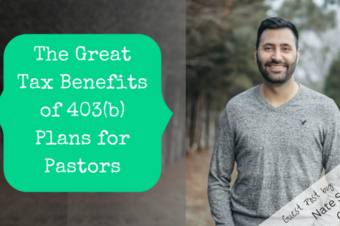Today is the big day! The IRS has officially opened the 2020 tax filing season for individual filers. We should throw a party!
Better yet, let’s talk about how to go about filing those tax returns that they are now accepting. As a pastor, you have unique tax issues like the housing allowance and being dual status, so it’s not as easy for you as it is for others. You can’t just use any old tax software and trust that your taxes will be prepared correctly.
Awhile back, I was asked which tax software is best for pastors. I didn’t actually know, so I turned the question over to my readers. This article is the result of my completely unscientific study with a small sample size. If you would like to contribute to our collective knowledge, please share your experience in the comments!
Tax Preparation Software Programs For Pastors
According to my readers, TurboTax wins as the best software for pastors. Tawn shared, “We use TurboTax. It has been very helpful to have it walk us through options step by step. They are aware of SECA and housing allowance for clergy.”
Joicy said, “TurboTax for home and small business has been my go-to method, and the program addresses pastoral needs pretty well. They walk you through it, and also identify any possible errors or ‘red flags’. I would definitely recommend it.”
Quickbooks online was mentioned but it probably isn’t a good choice for most pastors. Jeremiah told me, “There’s not a lot of help for clergy specific information so you have to do your own research outside of Quickbooks. If you’re looking for taxes done for you without much thinking involved this probably isn’t the best solution. If you have a relatively simple tax return, this should be good.”
Preparing Your Own Taxes
If you’re going to do as much work as Jeremiah had to with Quickbooks, then you might as well just prepare and file your taxes on your own. That’s what reader DeAnn does with the free fillable forms from the IRS website.
In a rural area with no CPAs who understand pastoral issues, she doesn’t have many other options. She said that the only issues she has had are making sure to claim all of the deductions they are eligible for as they missed the savers’ credit for a few years. It hasn’t been too much of a burden for her, though, as she says, “If you can follow all the steps and take your time, I would recommend doing it yourself.”
David doesn’t necessarily agree with her. He says, “Get help— you’re not as smart as you think and the IRS can hurt you.” He knows from personal experience, though he said he had a good experience with the IRS when he had to deal with them.
Hiring A Professional
General Tax Preparers
It’s true, the IRS can hurt you. But do you know what else can hurt you? A tax professional who doesn’t know what they are doing but charges as if they do. Joicy learned this, as she told me, “The first couple of years, I tried going to accountants and was greatly disappointed. Most know very little about pastors’ taxes and I was doing as much work (if not more) than if I just did them all myself. So that’s what I ended up doing (and saved some bucks).”
Pamela had a similar experience. She and her husband were working with a knowledgeable CPA through H&R Block who had to retire due to health reasons. She explained, “The guy last year just didn’t seem to know as much about our unique situation (minister plus self-employed income) and they raised their prices from $400 to $600…so we are going to try something else next year.” Smart move, Pam.
Specialized Tax Preparers
Not all tax preparers are expensive and clueless. As Pamela told me, when she worked with a CPA that understood her unique situation it was well worth the price. A tax professional that specializes in helping clergy is almost always worth the fees that they charge. As one reader said, “I won’t go anywhere else, they have saved me THOUSANDS over the years (and lots of grey hairs too!)”
All of my readers that work with professionals who understand ministerial issues have said that it is worth it. Scott said about his CPA of 15+ years that he has had, “very positive experiences on many issues he has advised me on and saved me money also. He serves many pastors and missionaries so he knows our issues with MHA, etc. I sleep much better by trusting his judgment and expertise to handle our taxes.”
How To Find A Tax Preparer Who Understands Pastoral Issues
I found that many pastors are “extremely happy” with their tax preparers. So, how do you find one of those and not the clueless guy from H&R Block that costs $600? Here are two questions to ask a potential tax preparer:
- Are pastors employees or self-employed for Social Security tax purposes?
- Is a pastor’s church salary subject to income tax withholding?
If they don’t answer these two questions correctly, run far, far away. You’ll be better off on your own. Here are the answers:
- Pastors are always self-employed for Social Security tax purposes. Learn more.
- Pastors are not subject to income tax withholding. Learn more.
Keep looking until you can find a tax professional that knows the answers to those questions off the top of their head. Here are some that were recommended by my readers. Now, I have not personally worked with any of these so I will not vouch for them and I don’t even know if they are taking on new clients. But, it doesn’t hurt to check them out, since other pastors are happy with their services.
In conclusion, if you want to prepare your own taxes using prepackaged software, TurboTax is the best bet for pastors. Doing it on your own without software is tedious and time-consuming but not impossible, especially if you’re a detail-oriented person or can’t find a CPA that understands pastoral issues. However, thanks to the internet, you should be able to find a professional to help you that understands your situation. When it comes to tax professionals, those that don’t understand clergy taxes are a huge waste of time and money and those that do are worth their weight in gold.
Happy tax filing! And please share your tax preparation experiences— either good or bad— with us in the comments so that we can all learn from you, too.











